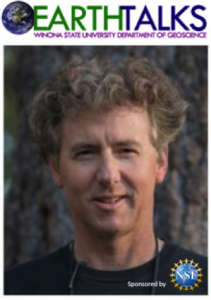 The Winona State University Geoscience Department Earth Talks Speaker Series presents the EarthScope distinguished lecturer, Bill Hammond, to present “GPS Imaging on Earth’s Vertical Motion: From Sierra Nevada to North America”. This event is funded by the National Science Foundation and will begin at 4 p.m. Monday, March 20, in the Science Laboratory Center Auditorium, room 120.
The Winona State University Geoscience Department Earth Talks Speaker Series presents the EarthScope distinguished lecturer, Bill Hammond, to present “GPS Imaging on Earth’s Vertical Motion: From Sierra Nevada to North America”. This event is funded by the National Science Foundation and will begin at 4 p.m. Monday, March 20, in the Science Laboratory Center Auditorium, room 120.
Hammond will talk how about the new data visualization technique, GPS Imaging, enhances the interpretation of vertical motions. Reminiscent of seismic tomography, the GPS Imaging data displays the dynamic response to various events, such as past and present large-scale geophysical events.
Hammond will also talk about the details of present-day shallow mantle flow and flexure of the lithosphere associated with processes such as uplift of the Sierra Nevada.
This talk will also cover the attention GPS Imaging focuses on the component uplift that is driven by large-scale geodynamic effects.
The presentation will include an introduction to the Plug and Play GPS data products.
Hammond is a geodesy and geophysics professor at the University of Nevada, Reno. Hammond does research using space geodetic techniques such as GPS and InSAR to study tectonic deformation on the continents, mountain building processes, active faults, dynamics of the lithosphere and structural controls on geothermal systems. Hammond also manages the MAGNET GPS network, including over 400 stations in five western states.
This event is free and open to the public.
EarthScope is a program of the National Science Foundation (NSF) that deploys thousands of seismic, GPS, and other geophysical instruments to study the structure and evolution of the North American continent and the processes that cause earthquakes and volcanic eruptions. It involves collaboration between scientists, educators, policy makers, and the public to learn about and utilize scientific discoveries as they are being made. The EarthScope Speaker Series is part of the larger EarthScope Education and Outreach program, seeking to present the scientific results of EarthScope researchers to faculty and students in departmental seminars at colleges and universities. Speakers are selected based on their research accomplishments involving EarthScope as well as their abilities to engage a variety of audiences.
The Earth Talks series serves as a forum through which experts from academia, government and the private sector, as well as WSU students and faculty, share their experiences and research results with the WSU geoscience community. The series also provides a venue for discussions of professional, educational, employment issues related to geology, natural resources, Earth science teaching, and other related disciplines.
For more information, contact Stephen Allard.
